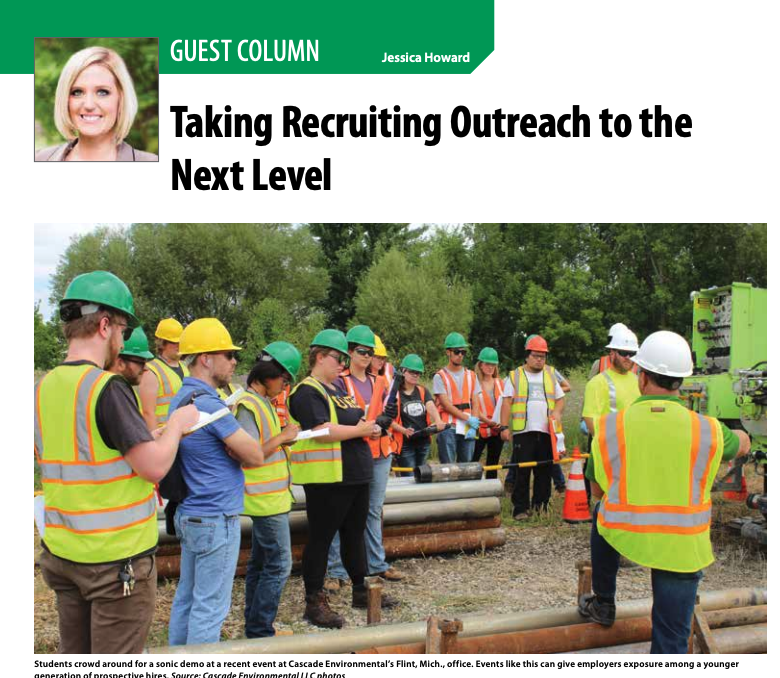Moving On From the Military: Advice for Veterans Starting a Civilian Career
By: Jessica AlexanderWhether you’ve served in the Armed Forces for two or 20 years, transitioning from the military to a civilian career can pose unique challenges. Some veterans find themselves unemployed for months as they struggle to decide what career path they want to take as a civilian, or to find an open door in the industry they’ve chosen. If this hits close to home, don’t give up hope. In this blog post, Vice President of Operations John McAssey shares his career transition story, as well as tips for how you can make your own a little smoother.
MEET JOHN MCASSEY
John began his career in environmental services with Vironex, an environmental and geotechnical drilling company, in 1995. He began his career as a Field Technician but was quickly promoted to Regional Manager for the Northern California office. When Vironex was acquired in 2015 by Cascade, he was again promoted to Director and, most recently, to Vice President.
After 25 years in the industry, John is a well-regarded subject matter expert and leader. But even some colleagues may not know the foundation for his career was laid in 1990, when John began five years of service as a Sergeant in the US Marine Corps. There, his Military Occupation Specialty (MOS) was 6112, better known as an Aircraft Mechanic. John worked as a Crew Chief specializing on the CH-46 helicopter. Throughout his career, John was stationed at Marine Corps Air Station Tustin in California, Marine Corps Air Station Futenma in Okinawa Japan, and served in Somalia in support of Operation Restore Hope.
THE MILITARY TO CIVILIAN TRANSITION
The transition from a military to a civilian career wasn’t clear cut for John. He initially thought with the aircraft training and certifications he acquired during his time in the Marines, it would make sense to go into the aviation industry.
But one thing in particular drew him into environmental services instead, and that was his experience managing his squadron’s HAZMAT program in Okinawa as a non-commissioned officer. In this role, he was able to complete his 40-hour OSHA training and had initial exposure to the environmental field.
TAKEAWAY: As veterans, it’s easy to forget we’ve worn many hats during our military service, whether through volunteer work or additional duties. Those roles can lead to potential careers in civilian life, so don’t overlook or downplay them when making your transition.
THE JOB SEARCH
The job hunt is hard, and searching as a transitioning veteran has its own specific challenges. Many veterans don’t know how to conduct a job search, who to talk to or call, or even how to interview—because those aren’t skills you need to advance your career in the service.
When John was job hunting, he focused on learning those skills and ensuring he made a good impression, whether on paper or in person. He found ways to highlight the transferable skills he’d gained during his military service, and show how they would benefit his future employer.
TAKEAWAY: You can improve your job search and interviewing skills, and learn how to highlight your skills and strengths. Check out organizations like the Centurion Military Alliance that provide training to veterans and their spouses, job boards like RecruitMilitary that connect candidates with veteran-friendly employers, and portals like Military OneSource to help you build a civilian resume and cover letter.
TRANSFERABLE SKILLS
Applying to Vironex was a smart move on John’s part. Not only did he possess relevant skills for the technical specialist role he was applying for, but the company employed many other veterans—meaning they were likely to recognize how John’s skills could easily transfer to a new job. At one point, Vironex was made up of approximately 90% veterans, the majority of which came from the US Marine Corps. This created a workplace culture that reinforced some of the same values and beliefs that were reinforced in the Corps.
John found that hiring veterans was a successful strategy for the company because they seemed to have strong leadership skills, mechanical aptitude, problem solving skills, passion for hands-on work, and were reliable and dependable. These are all transferable skills that, as a veteran, you can showcase when making a move into your civilian career.
Jobseekers sometimes think they don’t qualify for an open position because they don’t have the exact skillset referenced in the job description—but veterans often have many of the skills listed, they’re just used to describing them differently. Don’t let tiny discrepancies between the job description and your experience stop you from applying. Instead, show how the skills you gained during your military service can benefit the employer in the position you are applying for.
TAKEAWAYS: Network with other veterans, and keep in touch with your former colleagues. They may be working for companies that value veterans’ transferable skills and work ethic, and be able to point you toward open opportunities. Additionally, don’t be intimidated by job descriptions that aren’t perfectly aligned with your experience—you may be much closer to the ideal candidate than you think.
WORDS OF ADVICE FOR VETERAN JOBSEEKERS
According to John, the most rewarding aspect of his career at Cascade has been the ability to lead his team and grow a company with a solid foundation. Clients rely on him, and his superiors trust him to do the job right. That level of trust and freedom provides a sense of ownership over his work and his career that John values.
If you’re a veteran deciding on your next step, John advises taking the time to really examine the skillset you developed in the military, and what it is that you most enjoy doing. This is your career, and when making the jump from military to civilian, you are in total control of where you go next.
Interested in transitioning from the military to a career at Cascade? Reach out to Talent Acquisition Director Jessica Alexander (a veteran herself) at [email protected] or apply today at www.cascade-env.com/careers!






